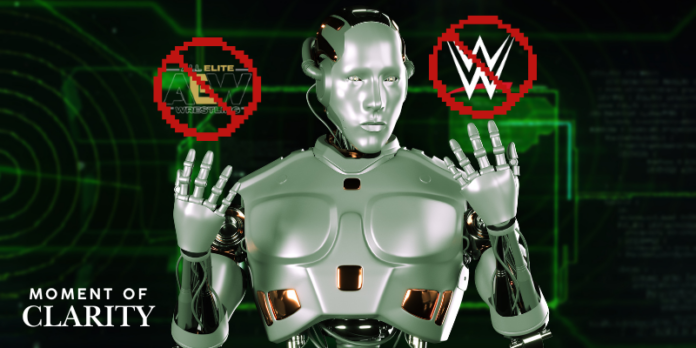
What if I told you that your thoughts may not be your own? Or that the wrestling fans you interact with online could be nothing more than bots?
Have you ever noticed that the same handful of wrestling fans and personalities dominate multiple spaces? Or that outdated and divisive narratives tend to come from profiles that seem AI-generated?
What if the Dead Internet Theory could be applied to pro wrestling fandom?
Cue X-Files theme.
Is this a crazed conspiracy theory? Probably. But it’s still worth exploring.
Before we dive in, let’s first break down: What exactly is Dead Internet Theory?
What is Dead Internet Theory?
Via ChatGPT (ironically):
“The Dead Internet Theory is a conspiracy theory that suggests most of the internet is no longer run by real people but is instead dominated by AI-generated content, bots, and automated systems. According to this theory, a significant portion of online interactions, discussions, and even social media engagements are controlled by artificial intelligence, corporations, or government agencies to manipulate public opinion, push propaganda, or drive consumer behavior.”
This theory has been largely debunked, but that doesn’t mean it’s completely baseless.
Studies show that bots play a major role in shaping online discourse. In 2020, an estimated 15 percent of all Twitter/X users were bots—roughly 48 million accounts at the time. Former FBI security specialist Dan Woods believes the real number is much higher, estimating:
“In all likelihood, more than 80 percent of Twitter accounts are actually bots.”
While 80 percent is likely an overestimate, the influence of bots is undeniable. Even a small percentage of bots, between five and ten percent, can manipulate public opinion by repeating specific narratives over and over again—until people start believing them.
So this begs the question: What does this have to do with professional wrestling?
Tony Khan Was Right About Bots… Sort Of
Back in 2022, Tony Khan caused a stir by claiming that a horde of anti-AEW bots was spreading negativity online—allegedly paid for by WWE.
While WWE funding bots remains highly unlikely, he wasn’t entirely wrong about bots being involved in wrestling discourse.
Ever wonder why so much of the activity of these accounts is retweets and replies? Like who actually has 80% of their activity as straight up retweets?
— Tony Khan (@TonyKhan) April 8, 2022
Where Tony Khan might have been off is in assuming this was an anti-AEW exclusive issue. The reality is that bots exist on both sides of the fandom war.
Both AEW and WWE have fan-driven accounts that behave in eerily similar ways. Whether or not bots are being paid for is highly debatable, but the bigger issue isn’t just bots—it’s how people start thinking like them.

Robotic Hiveminds and Repeated Narratives
Plenty of misleading narratives about AEW exist online. Many of them are easily debunked, yet they continue to spread like wildfire.
Why?
Because negative discourse generates engagement.
Social media algorithms reward outrage. Whether it’s about AEW’s attendance, WWE’s booking, or some backstage controversy, heated debates dominate the conversation.
Even when bots make up a small percentage of users, their constant repetition of false narratives influences real people. Research suggests that even a five to ten percent bot presence can significantly sway public perception.
The result is that even real fans start repeating the same talking points, whether they’re accurate or not.
Wrestling influencers and podcasters are part of this cycle as well. Some of them—whether knowingly or not—push misleading narratives about AEW or WWE without applying basic scrutiny.
Suddenly, those narratives become “truth” in the eyes of many fans, even when the facts say otherwise.
At this point, we have to ask:
The Dead Internet Wrestling Fan Theory
This theory suggests that much of wrestling discourse, engagement, and even opinions online are either driven by bots or driven by people engaging in bot-like behavior.
In other words, many fans are not applying critical thinking. They latch onto narratives that fit their biases. They spread the same talking points without checking facts.
This is not just an AEW vs. WWE issue. This happens in all fandoms.
For example, many AEW detractors focus less on the actual content of the product and more on attendance numbers, television ratings, backstage drama, or Tony Khan’s Twitter habits.
This happens on the other side too. Tribalism exists in all fandoms, but the AI-driven engagement cycle amplifies it to new extremes.
Is this the result of actual bots? Or have real fans become part of an automated system without realizing it?
Final Thoughts: Are We Thinking Like Bots?
The Dead Internet Wrestling Fan Theory offers an interesting explanation for why online wrestling discourse feels so toxic, repetitive, and shallow.
Are there bots in the wrestling space? Yes, but probably not as many as conspiracy theories suggest.
The bigger issue is how social media encourages robotic engagement—fans repeating talking points without critical thinking.
At the end of the day, it takes nuance and objectivity to look at WWE and AEW fairly, to see both the positives and negatives without falling into tribal warfare.
I have said before—I am not a WWE fan. I wish them and their talent well, but my biases prevent me from commenting on their product fairly. That’s why I generally don’t.
So, now I ask you:
Do you think like a bot?
Have you interacted with wrestling fans that seem like bots—or at least think like them?
Or… are you a bot?
JDS







